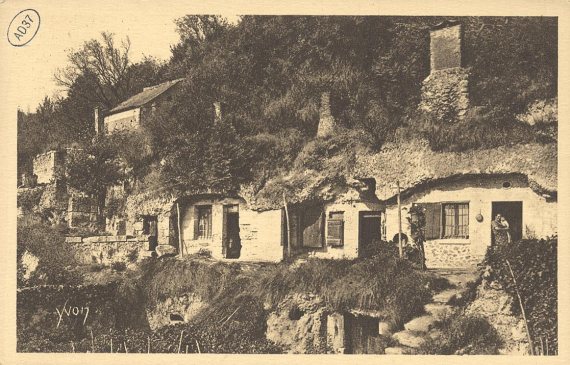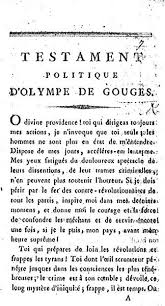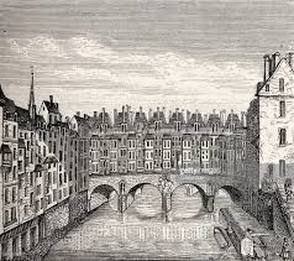|
Olympe was arrested on 20 July 1793. Three weeks before that, she was moving her furniture from Paris to a small house she had bought in the countryside near Tours, and where she was about to retire. She had been away visiting properties and spending time with her son, but had come back to Paris to see to the removal of her things. Olympe knew that by being in Paris, and publishing more political tracts, she was putting herself at risk. But the decree against the Gironde had just been issued and she felt she had to do something. Her Political Testament, written at time, reflects her anger and uneasiness: If, in a final effort, I can still save the republic, (chose publique), I desire that even while they immolate me to their fury, my sacrificers still envy my fate. And if one day, posterity notices women, perhaps the memory of my name will be of value. I have planned everything. I know that my death is unavoidable, but how beautiful and glorious it is, for a well-born soul, when ignominious death threatens all good citizens, still to give one's life for our dying country! Her next tract, The Three Urns, is an attack on the Paris Commune. It is printed by her imprimeur, Longuet, on 15 July. He draws 1000 copies. She sends a copy to the committee of public safety, and one to Herault de Seychelle, then she waits a few days - no reply, which she takes to mean that she can go ahead. Her distributer, or afficheur, is a Citizen Meunier who lives in the Rue de la Huchette. On 20 July, Olympe leaves her apartment on the Ile de la Cite, crosses the bridge St Michel, and turns left into the Rue de la Huchette. The Pont St Michel and the Rue de la Huchette are still there. The actual Pont St Michel dates from the mid-nineteenth century. Earlier photographs show a similar looking bridge, with four arches, rather than two, and less flat. And back in the eighteenth century, it would still have had the more traditional aspect of the Medieval bridge, it would have been covered in wooden shops and houses. The members of the Commune are reputed to have met in a tavern on the Rue de la Huchette. If true, this may well have influenced Meunier's decision not to post Olympe's Three Urns. What he actually told her, on the morning of her arrest, is that he was worried that it would rain. One imagines Olympe looking up at the clear sky, puzzled, before she set out to find another distributor on the Pont St Michel. But when she got there, Meunier's daugher, who had followed her pointed her out to three policemen and members of the national guard, She was arrested her and taken to the Depot prison of the Mairie.
0 Comments
|
About
This is where I live blog about my new book project, an intellectual biography of three French Revolutionary women philosophers. Categories
All
Archives
November 2022
|



 RSS Feed
RSS Feed